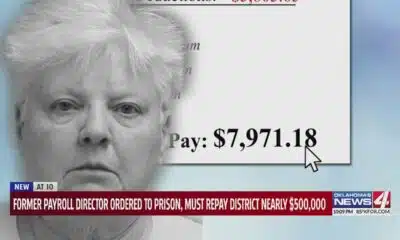News from the South - Arkansas News Feed
Sculpture depicts May 26 tornado that forever changed Rogers
SUMMARY: In Rogers, a new sculpture named “Tornado Town” serves as a healing monument for the community after the violent storm on Memorial Day weekend. The sculpture, created from 475 donated trampoline springs, depicts the tornado that struck on May 26. Weighing 200 pounds and built from local damaged property, it took 500 hours to complete. The design features a unique structure to support its display, as it may not have a permanent location yet. Community members hope this artwork will allow them to reflect on the storm’s lasting impact.
Sculpture depicts May 26 tornado that forever changed Rogers
Subscribe to 40/29 on YouTube now for more: http://bit.ly/PTElbK
Get more Northwest Arkansas news: http://www.4029tv.com
Like us: http://facebook.com/4029news
Follow us: http://twitter.com/4029news
Instagram: https://www.instagram.com/4029news/
News from the South - Arkansas News Feed
Rogers Public School bus drops student off at grocer store, father wants answers
SUMMARY: A Rogers father, Conrad Henson, says his daughter was dropped off at a grocery store instead of her bus stop on the first day of school. Rogers Public Schools states that if a student is on the wrong bus, the driver should return them to school or their stop. Henson’s daughter, a sophomore who rides multiple buses, was dropped off at Harp’s grocery store after a bus transfer mix-up. The district says the confusion began when the student boarded the wrong bus due to incorrect information given to the family. Officials apologized and plan to meet with bus drivers to prevent future incidents.
Rogers Public School bus drops student off at grocer store, the father wants answers Subscribe to 40/29 on YouTube now for …
News from the South - Arkansas News Feed
Arkansas lawmakers urge insurance department to ‘speed up’ regulating pharmacy benefit managers
by Tess Vrbin, Arkansas Advocate
August 15, 2025
Arkansas lawmakers on Friday questioned whether the state Insurance Department is doing enough to enforce regulations on pharmacy benefit managers, the national prescription drug middlemen that have long frustrated state officials and local pharmacists.
Pharmacy benefit managers (PBMs) negotiate prescription benefits among drug manufacturers, distributors, pharmacies and health insurance providers, and the biggest ones also own pharmacies and insurers.
The Insurance Department has been receiving fewer complaints from pharmacists alleging illegal behavior from PBMs since December, when the Arkansas Legislative Council approved a rule to require PBMs to include “fair and reasonable” dispensing fees in their reimbursements for prescription drugs, Daniel Holland, general counsel for the department’s PBM division, told the council Friday.
Pharmacies sent the department roughly 3,000 complaints in 2024, claiming PBMs either paid them below the national average of what drugstores pay wholesalers for drugs or paid them at or just above this amount, AID’s general counsel told lawmakers last year. This practice has been illegal since the state enacted Act 900 of 2015.
The Insurance Department analyzed 3,347 data reports from health plans and PBMs and found that 654, or 19%, “consistently reimburse pharmacies below NADAC,” the national average drug acquisition cost, according to the department’s report to the council. These 654 plans, managed by 12 PBMs found to be violating state law, “cover approximately 340,000 Arkansas lives,” the report states.
The Insurance Department asked six of the 12 PBMs for corrective action plans within the past month. Those drug benefit managers have until next month to implement those plans and report back to the department, which “will then evaluate whether those PBMs have increased their average reimbursement to NADAC along with a fair and reasonable cost to dispense,” the report states. The other six PBMs claimed confusion about the request or problems with the data.
“All of this is in an effort to figure out exactly how many plans are paying below NADAC on average so that we can minimize the impact of the cost to dispense [drugs],” Holland said.
The amount the Insurance Department fines a PBM for violating Act 900 ranges from “extremely low” to $5,000, and it depends on the amount the company pays a pharmacy below the average acquisition cost, he said.
“There wasn’t a lot of certainty as to what the consequence was for payments below NADAC,” Holland said. “I’m trying to create that certainty so that everybody kind of knows [this is] where we start, and if we see a pattern, we’re going to go up, all the way to the point of possibly pulling or denying a license.”
Between June and July, the Insurance Department initiated nine new enforcement actions over 26 prescriptions reimbursed below NADAC, the report states. The investigations “will result in consent orders that include statutory penalties” or an Insurance Department administrative order if a PBM under investigation requests an administrative hearing.
Lawmakers’ concerns
Independent pharmacists said in September 2024 that they were struggling to stay open in rural areas with limited healthcare resources thanks to low PBM reimbursements. Lawmakers went on to pass the dispensing fee rule on a temporary and later permanent basis, though one Legislative Council subcommittee rejected the option and was overruled by the full council.
Sen. Jonathan Dismang, R-Searcy, clarified to his fellow lawmakers that the rule was about dispensing fees rather than about NADAC reimbursements, even though much of the Insurance Department’s report focused on the latter.
“Let’s make sure everyone’s paying everything they’re supposed to be first before we start talking about what it means for a dispensing fee [to be] fair and reasonable,” Dismang said Friday.
Holland confirmed that this is the department’s goal, but some lawmakers said pharmacies in their district are still struggling financially eight months after the rule passed.
“Fair and reasonable is one thing… [but] the local pharmacists are telling me that the PBMs are at fault and they’re not seeing the action that they need to see,” said Rep. Jim Wooten, R-Beebe.
Rep. Jack Ladyman, R-Jonesboro, said his constituents have told him similar things and asked Holland if the Insurance Department can “speed up this process.” Holland said the department should be able to assess the rest of its PBM data in the next 30 days.
At several lawmakers’ request, Holland agreed to compile a report detailing how many penalties the Insurance Department has levied against PBMs, how much money the penalties total, how many PBMs have been fined and how much the volume of complaints about PBMs has decreased this year.
There wasn’t a lot of certainty as to what the consequence was for payments below NADAC. I’m trying to create that certainty.
– Daniel Holland, general counsel for the Arkansas Insurance Department’s pharmacy benefit managers division
After more than a century serving Benton, Smith-Caldwell Drug Store closed in August 2023 due to financial insolvency and transferred its clients to Walgreens. Republican Sen. Kim Hammer, who represents Benton, said he believed the department should issue harsher penalties for PBMs that violate state regulations instead of increasing penalties gradually until they reach $5,000.
“I’d like the agency to quit pussyfooting around with [PBMs],” Hammer said. “‘Fair and reasonable’ has been a discussion for way too long.”
Three pharmacy benefit managers — OptumRx, Express Scripts and CVS Caremark — manage 79% of prescription drug insurance claims for approximately 270 million people, according to a July 2024 Federal Trade Commission report.
All three PBMs were among five plaintiffs that sued Arkansas in federal court over Act 624 of 2025. Hammer was a lead sponsor of the first-in-the-nation law, which would have banned PBMs from holding a permit to operate a drug store in Arkansas after Jan. 1, 2026.
The other two plaintiffs against Act 624 are the Navitus Health Solutions PBM and the Pharmaceutical Care Management Association. The latter sued Arkansas over Act 900 of 2015, and the U.S. Supreme Court upheld the law in 2020.
A federal judge temporarily blocked Act 624 in July, agreeing with the plaintiffs that the law “likely violates” the U.S. Constitution’s commerce clause and is “likely preempted” by a veterans’ health care program.
Act 624’s supporters have said the law is necessary to ensure patients’ access to prescription medications, particularly for patients who live in rural areas or need highly specific drugs. The law received overwhelming bipartisan support in the House and Senate.
Arkansas Advocate is part of States Newsroom, a nonprofit news network supported by grants and a coalition of donors as a 501c(3) public charity. Arkansas Advocate maintains editorial independence. Contact Editor Sonny Albarado for questions: info@arkansasadvocate.com.
The post Arkansas lawmakers urge insurance department to ‘speed up’ regulating pharmacy benefit managers appeared first on arkansasadvocate.com
Note: The following A.I. based commentary is not part of the original article, reproduced above, but is offered in the hopes that it will promote greater media literacy and critical thinking, by making any potential bias more visible to the reader –Staff Editor.
Political Bias Rating: Center-Left
This content primarily focuses on regulatory oversight and enforcement concerning pharmacy benefit managers (PBMs) in Arkansas, emphasizing protection for independent pharmacists and rural healthcare access. The detailed reporting on state actions to hold PBMs accountable and the challenges posed by large corporate entities aligns with a center-left perspective that supports government intervention to promote fairness and protect smaller businesses and consumers. However, the article maintains a factual tone, presents multiple viewpoints including Republican lawmakers’ concerns, and does not overtly advocate for progressive or partisan policy positions, placing it near the center of the political spectrum with a mild lean towards regulatory intervention consistent with center-left values.
News from the South - Arkansas News Feed
Immigration crackdown intensifies in D.C. under Trump order for federal control
by Ariana Figueroa, Arkansas Advocate
August 14, 2025
WASHINGTON — Local leaders and advocates Thursday said that President Donald Trump’s decision to seize the District of Columbia’s 3,400-member police force and deploy 800 National Guard members is a continuation of his administration’s immigration crackdown.
Since the president’s decision Monday to invoke the district’s Home Rule Act, checkpoints are being set up in busy neighborhoods, bulldozers are clearing out tents of people experiencing homelessness and Republican governors are volunteering their own National Guard members to bolster the president’s federalization of the district’s 68 square miles.
Videos of masked law enforcement officers making Washingtonians step out of their cars and conducting arrests have been posted on social media by journalists, drawing concern over civil liberties.
While Trump’s control of the district’s police force ends in 28 days, he’s signaled he wants Congress to extend his authority to deter the “crime emergency.”
Advocates questioned the situation. “There does appear to be evidence that non (Metropolitan Police Department) federal authorities may have exceeded the lawful bounds at some of those traffic stops … and there will be accountability if the law is violated,” said Norm Eisen, the executive chair of Democracy Defenders Fund, a litigation organization that has challenged many of the Trump administration’s actions, in a call with reporters.
Trump predicts enforcement ‘all over the country’
The checkpoints have drawn backlash from district residents and local elected leaders.
In a statement, district Councilmember Brianne Nadeau criticized the immigration enforcement at checkpoints.
“Last night what would have been a routine MPD traffic safety operation was co-opted by federal law enforcement agents,” she said. “Agents who are not trained in D.C. law. Agents who do not know our community. Agents who were not seeking to address traffic safety but rather were interrogating drivers on their immigration status.”
Trump Thursday said that law enforcement using the checkpoints as immigration enforcement was “a great step.”
“I think that’s going to happen all over the country,” the president told reporters at the White House after signing a proclamation celebrating Social Security‘s 90th birthday. “We want to stop crime.”
Violent crime in the district is at a historic 30-year low, according to the Department of Justice.
Eisen called the checkpoints unlawful.
“They’re using it as an immigration control checkpoint,” he said. “That is illegal.”
Bulldozing camps for homeless people
Homeless camps across the district are also being cleared as part of the president’s directive.
Trump Wednesday signaled that he plans to send a request to Congress for “a relatively small amount of money” to make improvements to the district.
White House press secretary Karoline Leavitt said Tuesday that if those people experiencing homelessness don’t agree to go to a shelter, they could face fines or jail.
“The homeless problem has ravaged the city,” Leavitt said. “Homeless individuals will be given the option to leave their encampment, to be taken to a homeless shelter, to be offered addiction or mental health services, and if they refuse, they will be susceptible to fines or to jail time.”
The district has faced a backlog in getting vouchers to those experiencing homelessness, according to Street Sense Media, a news outlet that focuses on reporting on homelessness in the district.
Local police to aid feds on immigration actions
The district’s police chief Thursday issued a new executive order allowing local police to aid federal officials in immigration enforcement for immigrants not in police custody.
The new order does not change the district’s law that prohibits local police from sharing information with federal immigration officials about people in police custody. It’s a policy for which Trump has criticized the city, calling it a “sanctuary city,” but the policy does not bar immigration enforcement.
Trump called Thursday’s executive order “a very positive thing,” especially at checkpoints in the district.
“When they stop people, they find they’re illegal, they report them, they give them to us,” he said.
Since taking office for a second term, the president has intertwined military involvement in immigration enforcement, such as sending thousands of troops to the southern border and deploying thousands of National Guard members to Los Angeles after protests sparked by the Trump administration’s immigration crackdown.
More National Guard movements possible
Additionally, the Trump administration is evaluating plans to establish a “Domestic Civil Disturbance Quick Reaction Force” composed of 600 National Guard members to remain on stand-by in order to be quickly deployed to any U.S. city undergoing a protest or other civil unrest within an hour, according to documents obtained by The Washington Post.
On Wednesday, in another new twist, Republican Tennessee Gov. Bill Lee said he’s prepared to send his National Guard members to the district. Lee added that U.S. Army Secretary Daniel Driscoll told him that the military might request states send troops to the district for law enforcement.
The Posse Comitatus Act of 1878 generally bars the use of the military for domestic law enforcement purposes.
While the president has stated he also wants to send in National Guard members to other cities – Baltimore, Chicago, New York City and Oakland – all heavily Democratic cities led by Black mayors, like he has done with the district, it can’t be replicated, said Abbe Lowell, a high-profile defense attorney.
“One thing that people need to remember about his assault on the District of Columbia, it is a very unique legal framework because of the Home Rule Act that gives him some ability to do something which he does not have in other states and cities where the governors still have some or the primary control over things like the National Guard,” said Lowell, who was with Eisen on the call with reporters.
A trial is underway this week challenging Trump’s move to federalize California National Guard members, in a suit filed by Democratic Gov. Gavin Newsom, after an appeals court temporarily upheld Trump’s move.
‘Racial undertones’ cited by Baltimore mayor
Baltimore Mayor Brandon M. Scott said Trump’s singling out of those cities, including the district, can’t be ignored.
“Every city that he called out had a Black mayor, and we’re talking about Black-led cities,” he said on the call with Eisen and Lowell. “We cannot overstate the racial undertones here.”
Scott also criticized the Trump administration for pulling federal law enforcement officers – Drug Enforcement Agency, Homeland Security Investigations, FBI, Customs and Border Patrol – from their duties. Instead they are “patrolling neighbors of Washington DC, stopping residents and checking cars instead of doing their actual jobs,” Scott said.
“If the president really wants to help these cities continue to lower violence and crime, he could go back to sending agents to their actual agencies and having them help us work on gun trafficking, work on violent drug organizations, and not taking these agents off to work on this immigration brigade that he’s had them on,” Scott said.
He added that he’s working closely with Maryland Democratic Gov. Wes Moore and “we’ll be prepared to take any legal and any other action that we need to take.”
Moore, who served in the U.S. Army, has criticized the president for calling in the National Guard to the district and raised concerns that service members do not have the same training as police officers.
Trump brushed those concerns off on Thursday.
“They’re trained in common sense,” the president said of National Guard members.
Emergencies
Eisen said Trump’s actions in the district are part of the president’s pattern of invoking “non-emergencies.”
On Inauguration Day, Trump declared a national emergency at the border, despite low levels of immigration.
In March, he invoked the Alien Enemies Act of 1798, a wartime law only used three times previously.
Trump’s decision to declare a “crime emergency” in the district earlier this week came after a former U.S. Department of Government Efficiency, or DOGE, official was injured in an attempted carjacking incident around 3 a.m. Eastern near the Logan Circle neighborhood. Two Maryland teenagers were arrested on charges of unarmed carjacking in connection with the incident.
“Well, what he’s doing in the District of Columbia, including illegal traffic stops, what he’s doing is of a piece with that dictatorial approach,” Eisen said of the president.
Arkansas Advocate is part of States Newsroom, a nonprofit news network supported by grants and a coalition of donors as a 501c(3) public charity. Arkansas Advocate maintains editorial independence. Contact Editor Sonny Albarado for questions: info@arkansasadvocate.com.
The post Immigration crackdown intensifies in D.C. under Trump order for federal control appeared first on arkansasadvocate.com
Note: The following A.I. based commentary is not part of the original article, reproduced above, but is offered in the hopes that it will promote greater media literacy and critical thinking, by making any potential bias more visible to the reader –Staff Editor.
Political Bias Rating: Center-Left
This content primarily critiques former President Donald Trump’s use of federal power in Washington, D.C., highlighting concerns about civil liberties, racial implications, and the legal limits of his actions. The reporting includes voices from Democratic local leaders and advocacy groups opposing the federalization and immigration enforcement tactics, while also providing Trump’s statements and perspectives. Overall, the tone and framing lean toward a critical view of Trump’s policies, reflecting a center-left perspective that emphasizes civil rights and local governance autonomy without extreme partisanship. The article balances official statements and criticisms but maintains a critical lens on Trump’s approach.
-
News from the South - Oklahoma News Feed7 days ago
Former payroll director ordered to prison, must repay district nearly $500,000
-
News from the South - Texas News Feed22 hours ago
Kratom poisoning calls climb in Texas
-
Local News5 days ago
Bay St. Louis artist commemorates Amtrak’s return with hundreds of handmade medallions
-
News from the South - Arkansas News Feed3 days ago
Idaho is losing OB-GYNs. Doctors who remain are trying to shoulder the extra burdens.
-
News from the South - Georgia News Feed6 days ago
Labubu vs. Lafufu: How to spot a fake doll | FOX 5 News
-
News from the South - Georgia News Feed5 days ago
RCSS: Students showed growth on Georgia Milestones Assessments for 2024-2025
-
News from the South - West Virginia News Feed5 days ago
Lower Mud River Project signed and approved in Milton
-
The Center Square6 days ago
Net negative migration is harmful to the economy, economists say | National









































